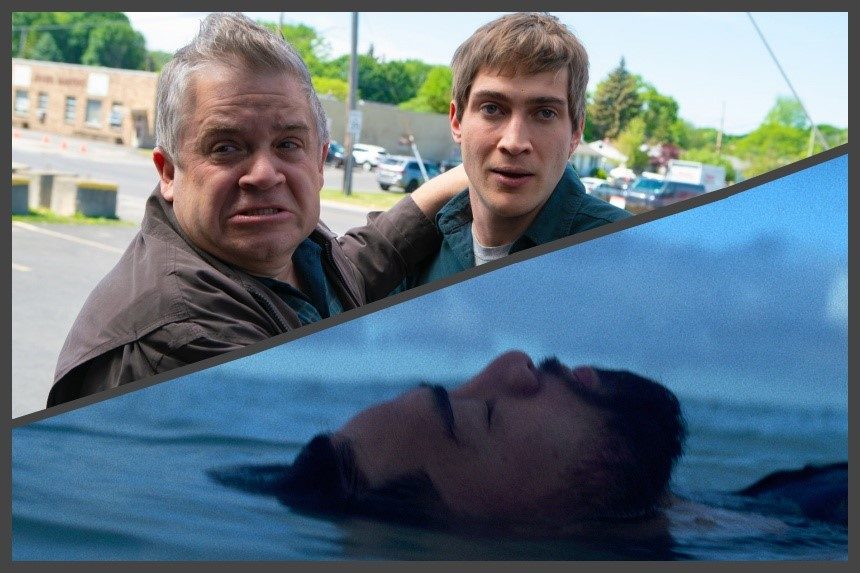Untold: The Girlfriend Who Didn’t Exist
⭐️ ⭐️ ⭐️⭐️
Run Time: 2 hours 4 minutes
Directors: Ryan Duffy, Tony Vainuku
Streaming on Netflix
I Love My Dad
⭐️ ⭐️ ⭐️
Rating: R
Run Time: 1 hour 36 minutes
Stars: Patton Oswalt, James Morosini
Writer/Director: James Morosini
In Theaters and Streaming
In one of those cosmic coincidences that occasionally add an exclamation point to some ongoing cultural phenomenon, two new films — each squirm-inducing in its own creepy way — explore the latter-day Internet phenomenon known as catfishing.
The uncomfortable fact is, if you are on Facebook or Instagram you are catfished almost daily. Catfishing most often comes in the form of a mysteriously intriguing “friend request” from a stranger — usually accompanied by sultry, pouty, or brooding mug shots of a man or woman who is, to put it kindly, totally out of your league.
Ninety-nine percent of the time, you’ll delete those posts at first glance. But every so often one slips through — usually because the culprit has already gained some legitimacy by reeling in a friend or two of yours.
Usually, as the label implies, catfishers are simply looking for personal information they can exploit. But now and then there comes one who wants something more.
A catfishing expedition begins with good intentions in I Love My Dad, a cringey comedy written and directed by young James Morosini, who also plays the main character, a troubled 20-something named Franklin.
Franklin is on the outs with his estranged father, Chuck (Patton Oswalt); so much so that he has even blocked Dad from seeing his Facebook page. Since Facebook was Chuck’s chief way of following his son’s life, the desperate dad comes up with what seems like a foolproof plan: He’ll pretend to be someone else on Facebook, re-friend his son, and then sit back and return to his lurking ways.
Dad assumes the online persona of Becca (Claudia Sulewski), a sweet table server at a local diner he frequents. He cut-and-pastes her photos onto a new profile and befriends Franklin — who throws a monkey wrench into the scheme by becoming besotted with his beautiful new online friend.
Oswalt is masterful as Chuck — a white-collar schlub who lurches from one ill-advised strategy to another, burrowing ever deeper into a rabbit warren of deceit, wincing in parental pain as Franklin urges “Becca” to engage in ever more intimate online encounters.
Some of the more excruciatingly inappropriate moments in I Love My Dad would be downright unbearable if not for one fact: From the start, we’re told that writer/director/costar Morosini is here telling his own true story; a warped family history of a distant dad going to unimaginable lengths to reconnect with his grown child.
Twisted as the story is, it all comes from a good place — and Patton and Morosini are just sweet enough to let us swallow the whole thing without gagging. Too much.
Exhibit A for Catfishing Cautionary Tales is NFL player Manti Te’o, the focus of Netflix’s jarring two-part documentary, Untold: The Girlfriend Who Didn’t Exist. Blessed with equal helpings of athletic prowess and crippling naiveté, Te’o was hooked by a pathological catfisher while at the same time breaking records on the Notre Dame football team.
Her name, Te’o believed, was Lennay Kekua. Like him, she was from Hawaii. She claimed to have randomly found his profile on Facebook and wanted to friend him simply because he seemed like a good man. She was in California; he was in Indiana. Their frequent text messages soon exploded into an online romance. They never met in person, but they were undeniably in love.
Then tragedy struck: On September 11, 2012, Te’o’s grandmother died. That same day — not so coincidentally, it turns out — so did his girlfriend. You may remember the media hoopla that surrounded the heartbroken young man as he took the field for Notre Dame mere hours later, dedicating the game to these two women, his sainted grandmother and the love of his life, both taken from him at once.
Only “Lennay” didn’t exist. She was fiction, created by a disturbed young man, named Ronaiah Tuiasosopo, who was obsessed with Te’o.
The lie was exposed almost immediately, but it was the victim, and not the perpetrator, who suffered the most. Te’o was humiliated and mocked mercilessly on late-night TV. His on-field performance slipped. He dropped from being a sure-fire first-round NFL pick to barely a second-rounder. Tuiasosopo, on the other hand, melted into the background.
Fast forward a decade, and the filmmakers find both characters in this sordid drama still trying to sort out their lives. Te’o’s once-boyish face is now handsomely chiseled — although his eyes still occasionally dart about with “how-could-I-have-been-so-stupid?” despair. He’s had an adequate, if not stellar, football career — nothing like the greatness that was predicted in his college days. But he is forthright; a devout Christian who desperately wants something good to come of his most embarrassing chapter.
In contrast, Tuiasosopo, now in the process of transitioning to a woman, has apparently not jettisoned the toxic narcissism that led her to ruin the life of a man she’d never met. Even as she looks back with some astonishment at the wreckage she left in her wake, she says, it was probably all worth it: Through the experience, she discovered her true self.
“I forgive him,” says Te’o.
He’s a better man than I am.
Become a Saturday Evening Post member and enjoy unlimited access. Subscribe now



